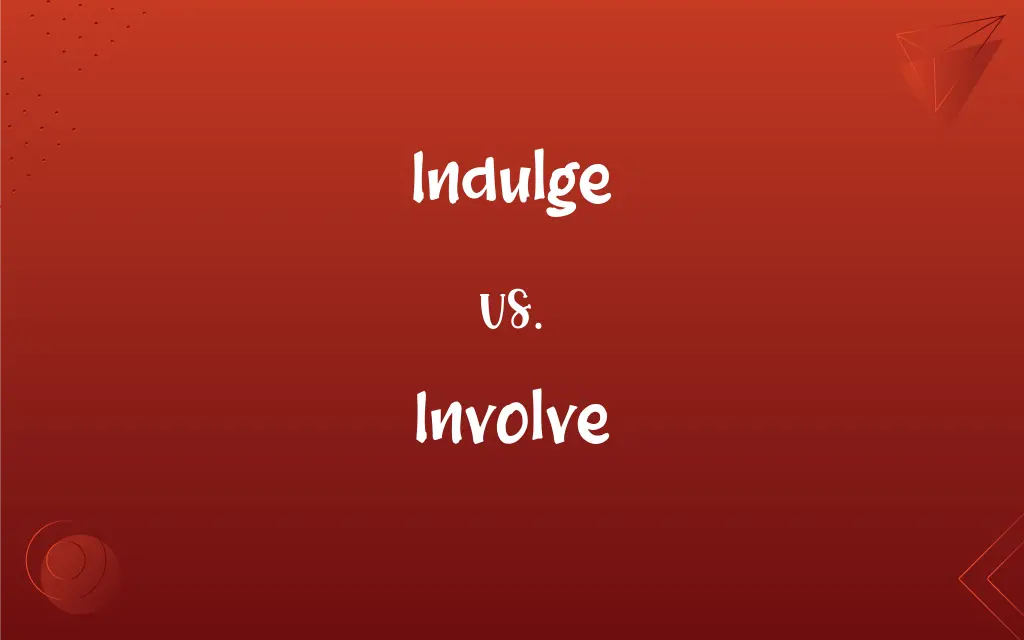Indulge vs. Involve: What's the Difference?
Edited by Aimie Carlson || By Harlon Moss || Published on February 2, 2024
Indulge refers to allow oneself to enjoy pleasures. Involve refers to include or engage in an activity.

Key Differences
Indulge primarily means to allow oneself or others to enjoy something desired. It often carries a connotation of luxury or pleasure, sometimes to excess. Involve, in contrast, means to include someone or something in an activity or situation. It implies participation or inclusion, often in a task or event.
When one indulges, they often give in to their desires or whims. This can be in terms of food, activities, or luxuries. On the other hand, to involve means to engage or entangle in an affair, matter, or circumstance. It suggests an active role or contribution in a process or event.
Indulgence can sometimes imply over-enjoyment or excessive engagement in a particular activity, often for personal pleasure. In contrast, involvement is more about engagement and participation, without the connotation of excess or pleasure. It is about being a part of something larger than oneself.
Indulge can also have a positive connotation, as in indulging in hobbies or interests. It's about self-care or treating oneself. Involve, however, is about collaboration, contribution, or sometimes entanglement in situations, whether positive or negative.
Indulge often relates to personal choice and freedom, reflecting a decision to enjoy something. Involve, in contrast, may not always be a matter of choice; it can be a necessity or requirement in certain contexts, such as job responsibilities or family duties.
ADVERTISEMENT
Comparison Chart
Connotation
Pleasure, luxury, sometimes excess
Participation, engagement, sometimes necessity
Focus
Personal enjoyment or self-care
Engagement or contribution to an activity or situation
Choice
Often a personal choice or desire
Can be voluntary or obligatory
Usage
Mostly used in a positive or neutral context
Neutral, can be positive or negative depending on context
Implication
Often implies a temporary or occasional action
Suggests a more sustained or ongoing engagement
ADVERTISEMENT
Indulge and Involve Definitions
Indulge
To treat with excessive leniency, generosity, or consideration.
Parents often indulge their children's whims.
Involve
To include as a necessary part or result.
The job involves a lot of travel.
Indulge
To give free rein to.
She indulged her imagination.
Involve
To affect or concern.
This matter involves serious issues.
Indulge
To allow oneself to enjoy something.
He indulged in a luxurious vacation.
Involve
To require as a necessary condition.
The project involves detailed research.
Indulge
To satisfy or yield to a desire or interest.
She indulged in her love for painting every weekend.
Involve
To engage as a participant.
He involved himself in community service.
Indulge
To take unrestrained pleasure in.
They indulged in gossip.
Involve
To cause to be included.
The plot involves several twists.
Indulge
To yield to (a desire or whim); gratify
Indulge a craving for chocolate.
Involve
To have as a necessary feature or consequence; entail
Was told that the job would involve travel.
Indulge
To yield to the desires or whims of (someone), often excessively
We indulged our daughter on her birthday.
FAQs
Can one indulge in work?
Yes, if they derive pleasure or satisfaction from it.
Can indulging be harmful?
Yes, if done excessively, it can lead to negative consequences.
What does it mean to indulge in something?
To allow oneself to enjoy a particular pleasure or desire.
Is involvement always a choice?
Not always; sometimes it's necessary or obligatory.
What is the difference between involve and engage?
Involve is broader, including engagement but also implying inclusion in a situation.
Can indulgence be a good thing?
Yes, when balanced, it can be a form of self-care or enjoyment.
Is it possible to indulge someone else?
Yes, by allowing or facilitating their enjoyment or desires.
Does involve imply responsibility?
Often, especially in a role or task that requires one's contribution.
Does involve always mean participation?
Yes, it typically implies active engagement or participation.
Can involvement be passive?
Rarely, as it usually implies active participation or engagement.
Does indulge always imply excess?
Not always, but it can have that connotation.
Can you indulge in a hobby?
Yes, indulging in hobbies is a common form of self-enjoyment.
Can involvement be emotional?
Yes, one can be emotionally involved in a situation or with a person.
Can one involuntarily become involved in something?
Yes, circumstances can sometimes force involvement.
Is it possible to overindulge?
Yes, overindulgence can lead to negative effects and is often cautioned against.
Is indulging a habit?
It can be, especially if it becomes a regular practice.
Can involve have negative connotations?
Yes, especially when it implies being entangled in difficult situations.
How does indulge relate to self-discipline?
It often requires self-discipline to balance indulgence and avoid excess.
What does it mean to get involved in something?
To actively participate or engage in an activity or situation.
Is indulging always selfish?
Not necessarily; it can be a healthy part of self-care.
About Author
Written by
Harlon MossHarlon is a seasoned quality moderator and accomplished content writer for Difference Wiki. An alumnus of the prestigious University of California, he earned his degree in Computer Science. Leveraging his academic background, Harlon brings a meticulous and informed perspective to his work, ensuring content accuracy and excellence.
Edited by
Aimie CarlsonAimie Carlson, holding a master's degree in English literature, is a fervent English language enthusiast. She lends her writing talents to Difference Wiki, a prominent website that specializes in comparisons, offering readers insightful analyses that both captivate and inform.































































